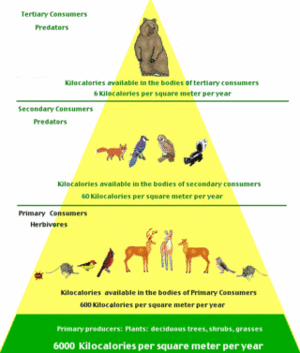Ecological energetics

| Topics: |
Ecological energetics refers to a suite of approaches in the environmental sciences that attempts to understand ecological structure and especially function from the perspective of energy costs and gains. It has been applied at scales from individual organisms to entire ecosystems. Generally, there is an implicit evolutionary backdrop; in other words, the question is often how does this or that morphology, physiology, or behavior contribute to selective advantage, that is, survival and the leaving of progeny.
A particularly good example of this is a study of European chickadees – explicitly, of their reproductive output in terms of the timing of their migration relative to the spring pulse of caterpillars, in turn attuned to the timing of leaf outbreak. It was found that those birds that nested just prior to the outbreak had much food for their young which could be gathered with relatively little effort. Those that nested too early or too late left far fewer offspring. Climate changes were impacting which behaviors were rewarded and which were not.
Energy studies have also been undertaken at the level of populations and ecosystems. Still recognized among the best, was the study at Silver Springs carried out by Howard T. Odum during the early 1950s. Perennial questions of such studies concern the efficiency of trophic (or food level) processes as energy is transferred from sunlight, to sugars produced by photosynthesis, to herbivores, and carnivores, and also the role of power in fitness. Finally, some ecologists have used such concepts applied originally to natural ecosystems to look at national economies from an energetic perspective, a field known as Biophysical economics. Such studies are thought to be increasingly useful as humanity appears to be facing an increasingly energy-constrained future.
Further Reading
- Hall, Charles A. S., 2004. Ecosystems and Energy: History and Overview. In, Cutler J. Cleveland, Ed.,The Encyclopedia of Energy. (Amsterdam, Elsevier/Academic Press).
- Odum, Howard T., 1957. Trophic Structure and Productivity of Silver Springs, Florida. Ecological Monographs, 27(1):55–112.